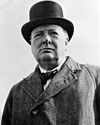|
Oliver Lyttelton, 1st Viscount Chandos
Oliver Lyttelton, 1st Viscount Chandos, KG, DSO, MC, PC (15 March 1893 – 21 January 1972) was a British businessman from the Lyttelton family who was brought into government during the Second World War, holding a number of ministerial posts. Background, education and military careerBorn in Mayfair, London, Lord Chandos was the son of the Rt. Hon. Alfred Lyttelton, younger son of George Lyttelton, 4th Baron Lyttelton. His mother was his father's second wife Edith, daughter of Archibald Balfour. He was educated at Eton and Trinity College, Cambridge. He served in the Grenadier Guards in the First World War, where he met Winston Churchill, and was awarded the Distinguished Service Order and Military Cross. The citation for his MC appeared in The London Gazette in October 1916 and reads as follows:
From 1947 to 1955 he served as the first President of Farnborough Bowling Club, Hampshire, in his Aldershot parliamentary constituency. Business careerAccording to the Dictionary of National Biography:[2]
After the Conservative Party left office in 1945, Lyttelton became the chairman of Associated Electrical Industries. Political career Chandos entered Parliament as Conservative Member of Parliament (MP) for Aldershot in a wartime by-election in 1940 and was sworn of the Privy Council the same year. He entered Winston Churchill's war coalition as President of the Board of Trade in 1940, a post he held until 1941, and then served as Minister-Resident for the Middle East from 1941 to 1942, and as Minister of Production from 1942 to 1945. He was again President of the Board of Trade in Churchill's brief 1945 caretaker government. After the Conservatives' 1951 election victory, he was considered for the job of Chancellor of the Exchequer. He fully expected the job,[3] but was seen as too linked to business and the City of London, so it was given to Rab Butler.[4] Instead he became Secretary of State for the Colonies, a position which he held until 1954. The latter year he was elevated to the peerage as Viscount Chandos, of Aldershot in the County of Southampton. Lyttelton was strongly anti-communist and in 1953 said "Her Majesty's Government are not prepared to tolerate the setting up of Communist states in the British Commonwealth".[5] During the 1963 Conservative Party leadership contest, Lyttelton favoured Rab Butler, but he no longer carried much influence in the party.[6] Family homeIn 1948, the 5th Earl Nelson sold Trafalgar Park, Wiltshire, to John Osborne, 11th Duke of Leeds, whose brother-in-law Oliver Lyttelton, 1st Viscount Chandos, lived there while he was an MP. Eventually Lyttleton bought the estate and lived there until 1971, when Jeremy Pinckney bought the house. Later careerAfter ending his career as an MP, Chandos returned to Associated Electrical Industries, and steered it to become a major British company. In 1961 he was invited to deliver the MacMillan Memorial Lecture to the Institution of Engineers and Shipbuilders in Scotland. He chose the subject "Jungle – or Cloister? – Some Thoughts on the Present Industrial Scene".[7] National TheatreIn 1962, Chandos became the first chairman of the National Theatre, serving until 1971. He then served as president until his death. His parents had been active campaigners for its development, and the Lyttelton Theatre, part of the National's South Bank complex, was named after him. During Laurence Olivier's tenure as director of the National, Chandos was a central figure in the controversy over a proposed production of Rolf Hochhuth's Soldiers. The production had been championed by Olivier's dramaturg, Kenneth Tynan. Though Olivier, a great admirer of Winston Churchill (who essentially is accused of assassinating Polish Prime Minister General Władysław Sikorski by Hochhuth) did not particularly like the play or its depiction of Churchill (whom Tynan wanted him to play), he backed his dramaturg. There was a potential problem with the Lord Chamberlain, who might not have licensed the play due to its controversial stand on Churchill. The National's board vetoed the production and Lord Chandos damned the play as a "grotesque and grievous libel".[8] Order of the Garter In 1970 he was made a Knight Companion of the Garter. His Garter banner, which hung in St George's Chapel in Windsor Castle during his lifetime, is now on display in the Church of St John the Baptist, Hagley.[9] Marriage and childrenLord Chandos married Lady Moira Godolphin Osborne, a daughter of George Osborne, 10th Duke of Leeds on 30 January 1920. They had three sons and one daughter:[citation needed]
Lord Chandos died in Marylebone, London, in January 1972, aged 78, and was succeeded by his eldest son, Antony. Lady Chandos died in May 1976, aged 84. ArmsReferences 
Further reading
External linksWikimedia Commons has media related to Oliver Lyttelton, 1st Viscount Chandos. Wikiquote has quotations related to Oliver Lyttelton, 1st Viscount Chandos. |
||||||||||||||||||||||||||||||||||||||||||||||||||||||||||



